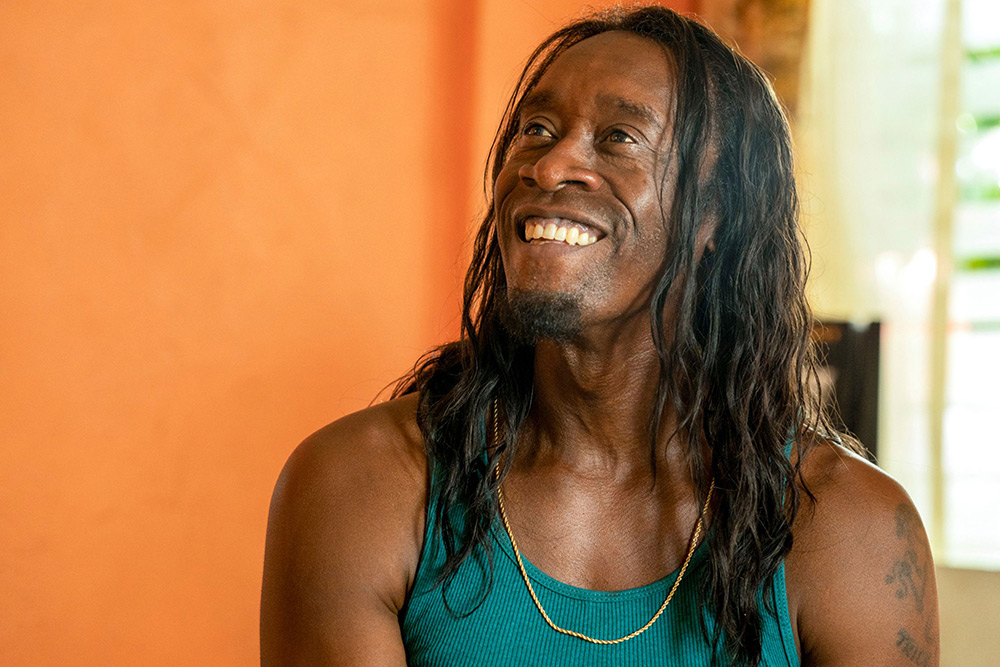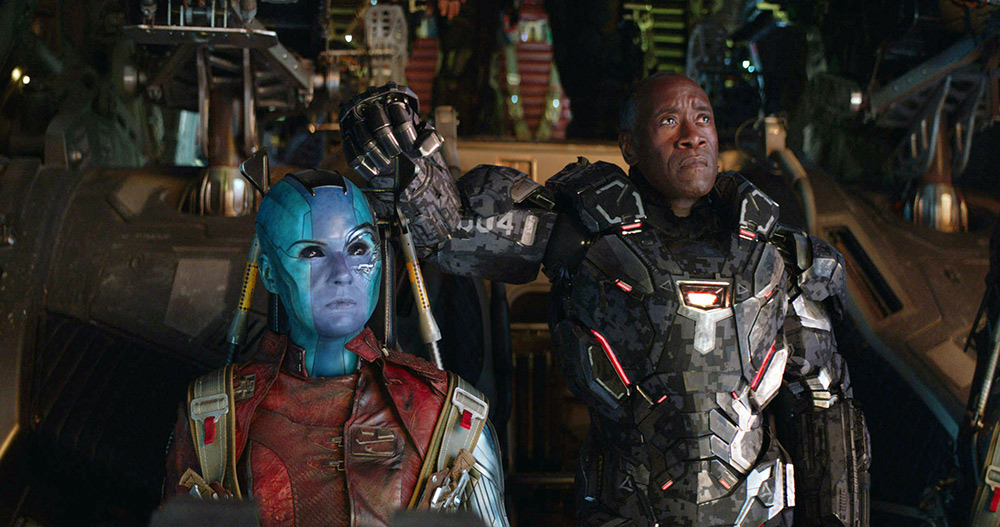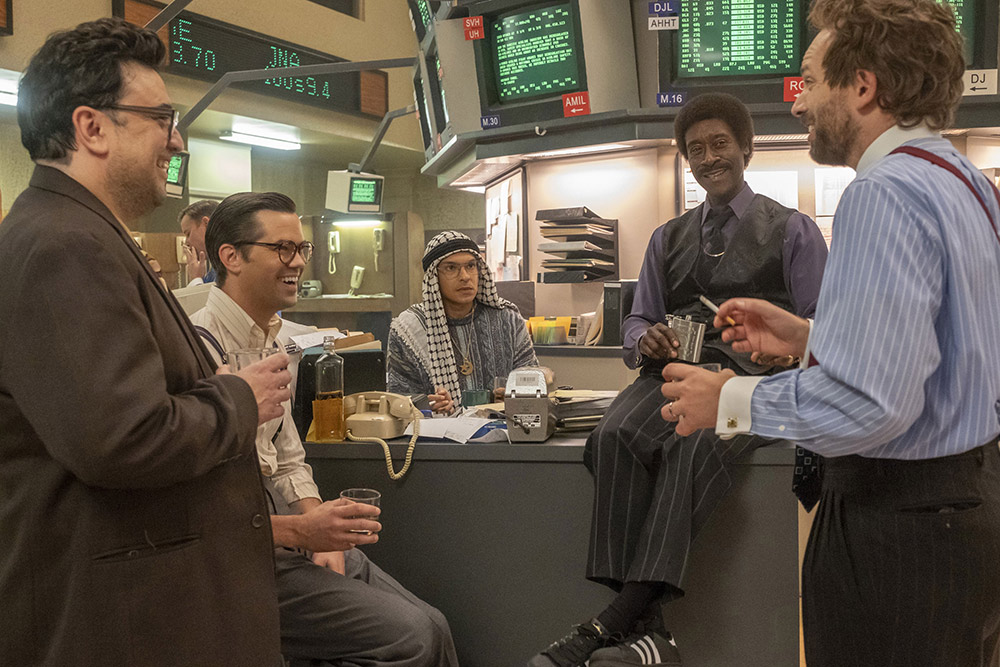
唐·钱德尔不愿透露漫威角色“罗迪”,即战争机器未来的命运,害怕被狙击手干掉。“我是想谈谈,但每次一开口脑袋上就会出现狙击枪瞄准的红点,所以只能闭嘴,”他对《财富》杂志说。他能讨论的是新一季《黑色星期一》,一部以上世纪80年代为背景的黑色喜剧,剧中他扮演非常激进且无道德观念的华尔街交易员莫·门罗。
第一季主要内容是莫和他手下诡计多端的员工们实施一项计划,十年当中充斥着挥霍无度、种族主义、性别歧视和同性恋恐惧症等各种行为,最终引发了所谓的1987年股市大崩盘。第二季共同出演的有雷吉娜·赫尔、安德鲁·兰内斯、保罗·谢尔、凯西·威尔逊和肯·马里诺,故事从股市崩盘之后开始,莫被陷害谋杀,他的前同事们则开启了新一轮行动:引诱、勒索政客们,目的是让他们放松对银行的管制。
最近,在股市因冠状病毒疫情而风雨飘摇之际,《财富》杂志采访了钱德尔。他表示也在关注股市,“感觉就像闭着眼睛坐过山车”。

3月15日第二季首映礼之前,55岁的钱德尔谈论了该剧如何反映特朗普时代的政治和金融贪婪、如何一边走攻击性喜剧路线一边讨论严肃问题、气候变化行动主义,以及2020年民主党应该做的事。
为简明起见,以下对话进行了摘编。
这一季的总体构想怎样?
嗯,主要是还原角色。莫方面,我猜主要看他的出身,然后看看他的最终归宿,看看布莱尔(安德鲁·兰内斯饰)怎么发展——显然是在上升,还有道恩(雷吉娜·赫尔饰)怎么走下坡路。我们觉得两人朝相反方向发展,然后再想办法让两人复合比较有趣。我想首先应该把局面弄乱,然后再看能做什么。
长发造型的创意从哪来的?
可能受一些打扮时髦又喜欢赚钱的女性启发吧。(笑)这些都是我们思考的事。“造型应该是什么样?”答案是要尊重时代。整个滨水区都充满了80年代风格,玩这种造型当然很有趣。
从那十年中挑出最荒谬的部分讲故事,一定很轰动。
最有趣的是大家都很认真。我的意思是,要回顾那个年代,然后说,“真的吗?当时是那样的?”人们都在叽叽喳喳地讨论,”你为什么要参与其中?“这部剧最有趣的地方是找到文化接触点,痛斥讽刺很多事。

到了90年代就不能用同样的方式嘲笑,因为伤痛记忆还很真切。
是啊。90年代,我们到了90年代也没好多少。
剧里有很多小笑话和深刻讽刺。拍摄的时候,演员有很多即兴发挥吗?
当然,我们排练的时候开很多玩笑,很多变成了正式开拍的台词。联合编剧大卫(卡斯普)和乔丹(卡汉)对此持开放态度,并会予以鼓励。他们不停地讲笑话,讲得最好的人当然会胜出。我们很鼓励即兴创作。每个人都想让对方笑,看看“到底能多好笑?”
扮演这样一个没有太多顾虑或道德准则的角色想必很自由。
当然。正因如此我从一开始就想演这个角色。这家伙是直接做事都是出自本能,风格是“射击,准备,瞄准”。他就是这种人。
进入那种思维方式是什么感觉?对于当年的交易者来说,除了能赚多少钱,从不考虑其他后果。
现在也没什么不同。当然了,现在规定要多一些,而且…嗯,这是断断续续的,对吧?有监管,然后管理部门介入,想把好处都抢走。逐利真的是人性。投资是个零和游戏。顺风顺水的时候尽可能多赚钱,规则往往比较宽松。尤其是那个年代,规则只限于监管强盗大亨,有点像狂野西部。我们做研究的时候跟很多人谈过,有很多亲身经历过那个年代的人说,“是的,所有人都疯了,每个人都在拼命捞钱。为了赢无所不用其极。”这就是底线。
真的,光赚钱还不够。把另一端的交易对手弄得郁闷,这让人感觉良好。一定要打垮交易的对家才行。我有个经历过那个年代的好朋友,那段时间他体重暴增,每天晚上酗酒,心脏病随时可能发作。后来他金盆洗手,再回头看的时候说,“哦天呐,当时我疯了。我太病态了,”市场文化就是这样。不留战俘。

剧中主要在讽刺80年代的荒谬,但很多笑料都源自悲哀的事实:性别歧视、种族主义、贪婪腐败等等,这一季主要涉及什么问题?
这一季我们肯定会讨论更多政治话题。不能剧透,但可以说我们在探究当时的文化差异。种族主义、性,角色的经历,还有更多的问题。剧中会还原很多事的原委。
考虑到当前时代,本季不可避免会深挖政治背景吧?
好吧,我们明显想影射现在,让节目接地气,贴近当今现实。但对安德鲁(兰内斯)的角色布莱尔来说,研究怎样搞定银行似乎也是自然的进步,他们在想,“需要搞定哪些人,具体该怎么做?”政治也是要研究的领域,有时会导致很恶劣的动机。
很悲哀。
确实很悲哀。但这是喜剧,所以我们主要用笑话、低俗玩笑之类去表现。这就是我们的目标,得保持平衡,既要做好记录又要淡化一些色彩,最后回到批驳人性的荒谬。不要把氛围弄得太低沉,但也别害怕触及黑暗,因为我认为这部剧很有弹性,能把两种(情绪)同时表现。有演员去表演,就尽量表现。
剧中背景下你也能说一些攻击言论,如果放到2020年肯定没法说。
是有点难把握,对吧?界限很明确,因为当时人们就是那样说话,那样工作,那样互动。很多话现在肯定不会说,当时人们就是如此沟通。如果不去了解,就不够尊重真实。但一定要注意说到点上,这样才能让2020年的观众理解现实意义。所以我们总是在打擦边球,边缘到底多宽并不知道,越线了才知道。
就像现在的喜剧一样。想突破极限,但也要意识到某些事只是种族主义或性别歧视,有些笑话没有提出任何观点,也并不好笑。
没错。笑点应该有意义。要记住希望达到什么目的。要让观众有代入感,另一方面要尽可能尊重原貌地扮演角色,所以要用剧中年代的语言和比喻方式。
为本季做研究时,你关注特朗普放松金融业管制有什么感受?
令我震惊的是,他有很多支持者似乎不知道底线是什么。他们支持的这位总统要给收入最高的1%人群减免1万亿美元的税。我不明白具体情况,只能想,“哦,好吧,这一定是种族主义或部落主义。”这不合逻辑,但不知怎的他们愿意支持。不知道怎么回事。我想,可能是信念吧。也许他们会获利的,能从税收减免中得到好处。其中的逻辑我反正不懂。
就像,气候变化也变成红蓝之争(红色代表共和党,蓝色代表民主党——译者注),而不仅是“地球上人类”面临的问题。类似问题现在都很棘手。必须选择一派,而不只是选择自己相信的观点,所以会遇到各种问题。比方说你是保守派,就得赞成保守派的所有观点;如果你是自由派,又必须赞成所有自由派的观点。不能去分析。这样很危险。
不容许存在细微差别。一定要加入一派。
是的,“选一派,站好队。”这是因为人们对环境和收入不平等深感绝望,在某些方面也无可厚非。很多情况真实存在,我们能感觉到,动物都喜欢这样,对吧?我们总认为人类比动物高级得多,但我们遇到老虎也只会从一块石头躲到另一块石头上。这就是人类的DNA。害怕的时候就是很容易被操纵,现在就是这种情况。失去理智,完全由情绪控制,感觉就是,“我需要在一群人里,不能一个人呆着。那边有老虎!”
很多人现在对气候变化不作为感到绝望。你能分享些让人们保持希望的事吗?
首先,关注度极其高。现在不管谁会获得民主党提名,所有候选人都把气候变化列入政纲,而且都知道这个问题很关键。已经没法粉饰。这是件大事,也是很大的变化。第二,我觉得年轻人都非常关注。谢天谢地,我们有格雷塔(桑伯格)和AOC(亚历山大·奥卡西奥-科特兹)这样的人,还有绿色新政。公众意见接近顶点。希望我们能够重新加入,加入全球社会推动环保进程。我们知道必须去做。别无选择。
人们有个特点,如果感觉不会直接影响自己就不愿采取行动。只要有点抽象,就感觉像是只跟别人有关,很多人都不会行动。必须想办法说,“不,这是气候变化,确实会影响到你。这是发生在你身边的事。”说服教育需要不断努力和创新。一定要不停地讲故事,而且希望不会成真,“水会漫过膝盖。佛罗里达会消失。现在能明白我在说什么了吗?”
我是“解决方案项目”组织的董事会成员,希望推动城市同意采用100%的绿色能源,主要跟一线社区、贫困社区和有色人种社区打交道,相关社区往往会直接承受不采取行动应对气候变化的后果,也要努力从草根层面采取行动,拓宽人们的视野。我们在各地都有成功案例,解决方案也往往来自必须直面问题的人,有些社区就介绍了遇到液压开采,或废水从工厂直接流到孩子上学的地方时如何抗争。他们在前线跟大公司战斗并取得胜利,但这并不是全国的重点,还有很多其他问题迫在眉睫。我们需要斗士的领导。我们需要总统和政府带领大家解决问题,要做到身先士卒。
今年大选中你打算保持活跃吗?
唔,我想多休息会。(笑)拭目以待吧。先等完成初选有提名候选人,然后开始行动,拼命努力支持他们,把党内团结起来,因为现在是一团散沙。我们要团结一致,否则只能再对付特朗普四年。没准还要对付8年或12年。他笑着说,但这真是开玩笑吗?我们可以说这很荒谬,但我们很可能指着世界上很多国家说,“是的,他们也是这么想的。”(财富中文网)
译者:夏林
唐·钱德尔不愿透露漫威角色“罗迪”,即战争机器未来的命运,害怕被狙击手干掉。“我是想谈谈,但每次一开口脑袋上就会出现狙击枪瞄准的红点,所以只能闭嘴,”他对《财富》杂志说。他能讨论的是新一季《黑色星期一》,一部以上世纪80年代为背景的黑色喜剧,剧中他扮演非常激进且无道德观念的华尔街交易员莫·门罗。
第一季主要内容是莫和他手下诡计多端的员工们实施一项计划,十年当中充斥着挥霍无度、种族主义、性别歧视和同性恋恐惧症等各种行为,最终引发了所谓的1987年股市大崩盘。第二季共同出演的有雷吉娜·赫尔、安德鲁·兰内斯、保罗·谢尔、凯西·威尔逊和肯·马里诺,故事从股市崩盘之后开始,莫被陷害谋杀,他的前同事们则开启了新一轮行动:引诱、勒索政客们,目的是让他们放松对银行的管制。
最近,在股市因冠状病毒疫情而风雨飘摇之际,《财富》杂志采访了钱德尔。他表示也在关注股市,“感觉就像闭着眼睛坐过山车”。
3月15日第二季首映礼之前,55岁的钱德尔谈论了该剧如何反映特朗普时代的政治和金融贪婪、如何一边走攻击性喜剧路线一边讨论严肃问题、气候变化行动主义,以及2020年民主党应该做的事。
为简明起见,以下对话进行了摘编。
这一季的总体构想怎样?
嗯,主要是还原角色。莫方面,我猜主要看他的出身,然后看看他的最终归宿,看看布莱尔(安德鲁·兰内斯饰)怎么发展——显然是在上升,还有道恩(雷吉娜·赫尔饰)怎么走下坡路。我们觉得两人朝相反方向发展,然后再想办法让两人复合比较有趣。我想首先应该把局面弄乱,然后再看能做什么。
长发造型的创意从哪来的?
可能受一些打扮时髦又喜欢赚钱的女性启发吧。(笑)这些都是我们思考的事。“造型应该是什么样?”答案是要尊重时代。整个滨水区都充满了80年代风格,玩这种造型当然很有趣。
从那十年中挑出最荒谬的部分讲故事,一定很轰动。
最有趣的是大家都很认真。我的意思是,要回顾那个年代,然后说,“真的吗?当时是那样的?”人们都在叽叽喳喳地讨论,”你为什么要参与其中?“这部剧最有趣的地方是找到文化接触点,痛斥讽刺很多事。
到了90年代就不能用同样的方式嘲笑,因为伤痛记忆还很真切。
是啊。90年代,我们到了90年代也没好多少。
剧里有很多小笑话和深刻讽刺。拍摄的时候,演员有很多即兴发挥吗?
当然,我们排练的时候开很多玩笑,很多变成了正式开拍的台词。联合编剧大卫(卡斯普)和乔丹(卡汉)对此持开放态度,并会予以鼓励。他们不停地讲笑话,讲得最好的人当然会胜出。我们很鼓励即兴创作。每个人都想让对方笑,看看“到底能多好笑?”
扮演这样一个没有太多顾虑或道德准则的角色想必很自由。
当然。正因如此我从一开始就想演这个角色。这家伙是直接做事都是出自本能,风格是“射击,准备,瞄准”。他就是这种人。
进入那种思维方式是什么感觉?对于当年的交易者来说,除了能赚多少钱,从不考虑其他后果。
现在也没什么不同。当然了,现在规定要多一些,而且…嗯,这是断断续续的,对吧?有监管,然后管理部门介入,想把好处都抢走。逐利真的是人性。投资是个零和游戏。顺风顺水的时候尽可能多赚钱,规则往往比较宽松。尤其是那个年代,规则只限于监管强盗大亨,有点像狂野西部。我们做研究的时候跟很多人谈过,有很多亲身经历过那个年代的人说,“是的,所有人都疯了,每个人都在拼命捞钱。为了赢无所不用其极。”这就是底线。
真的,光赚钱还不够。把另一端的交易对手弄得郁闷,这让人感觉良好。一定要打垮交易的对家才行。我有个经历过那个年代的好朋友,那段时间他体重暴增,每天晚上酗酒,心脏病随时可能发作。后来他金盆洗手,再回头看的时候说,“哦天呐,当时我疯了。我太病态了,”市场文化就是这样。不留战俘。
剧中主要在讽刺80年代的荒谬,但很多笑料都源自悲哀的事实:性别歧视、种族主义、贪婪腐败等等,这一季主要涉及什么问题?
这一季我们肯定会讨论更多政治话题。不能剧透,但可以说我们在探究当时的文化差异。种族主义、性,角色的经历,还有更多的问题。剧中会还原很多事的原委。
考虑到当前时代,本季不可避免会深挖政治背景吧?
好吧,我们明显想影射现在,让节目接地气,贴近当今现实。但对安德鲁(兰内斯)的角色布莱尔来说,研究怎样搞定银行似乎也是自然的进步,他们在想,“需要搞定哪些人,具体该怎么做?”政治也是要研究的领域,有时会导致很恶劣的动机。
很悲哀。
确实很悲哀。但这是喜剧,所以我们主要用笑话、低俗玩笑之类去表现。这就是我们的目标,得保持平衡,既要做好记录又要淡化一些色彩,最后回到批驳人性的荒谬。不要把氛围弄得太低沉,但也别害怕触及黑暗,因为我认为这部剧很有弹性,能把两种(情绪)同时表现。有演员去表演,就尽量表现。
剧中背景下你也能说一些攻击言论,如果放到2020年肯定没法说。
是有点难把握,对吧?界限很明确,因为当时人们就是那样说话,那样工作,那样互动。很多话现在肯定不会说,当时人们就是如此沟通。如果不去了解,就不够尊重真实。但一定要注意说到点上,这样才能让2020年的观众理解现实意义。所以我们总是在打擦边球,边缘到底多宽并不知道,越线了才知道。
就像现在的喜剧一样。想突破极限,但也要意识到某些事只是种族主义或性别歧视,有些笑话没有提出任何观点,也并不好笑。
没错。笑点应该有意义。要记住希望达到什么目的。要让观众有代入感,另一方面要尽可能尊重原貌地扮演角色,所以要用剧中年代的语言和比喻方式。
为本季做研究时,你关注特朗普放松金融业管制有什么感受?
令我震惊的是,他有很多支持者似乎不知道底线是什么。他们支持的这位总统要给收入最高的1%人群减免1万亿美元的税。我不明白具体情况,只能想,“哦,好吧,这一定是种族主义或部落主义。”这不合逻辑,但不知怎的他们愿意支持。不知道怎么回事。我想,可能是信念吧。也许他们会获利的,能从税收减免中得到好处。其中的逻辑我反正不懂。
就像,气候变化也变成红蓝之争(红色代表共和党,蓝色代表民主党——译者注),而不仅是“地球上人类”面临的问题。类似问题现在都很棘手。必须选择一派,而不只是选择自己相信的观点,所以会遇到各种问题。比方说你是保守派,就得赞成保守派的所有观点;如果你是自由派,又必须赞成所有自由派的观点。不能去分析。这样很危险。
不容许存在细微差别。一定要加入一派。
是的,“选一派,站好队。”这是因为人们对环境和收入不平等深感绝望,在某些方面也无可厚非。很多情况真实存在,我们能感觉到,动物都喜欢这样,对吧?我们总认为人类比动物高级得多,但我们遇到老虎也只会从一块石头躲到另一块石头上。这就是人类的DNA。害怕的时候就是很容易被操纵,现在就是这种情况。失去理智,完全由情绪控制,感觉就是,“我需要在一群人里,不能一个人呆着。那边有老虎!”
很多人现在对气候变化不作为感到绝望。你能分享些让人们保持希望的事吗?
首先,关注度极其高。现在不管谁会获得民主党提名,所有候选人都把气候变化列入政纲,而且都知道这个问题很关键。已经没法粉饰。这是件大事,也是很大的变化。第二,我觉得年轻人都非常关注。谢天谢地,我们有格雷塔(桑伯格)和AOC(亚历山大·奥卡西奥-科特兹)这样的人,还有绿色新政。公众意见接近顶点。希望我们能够重新加入,加入全球社会推动环保进程。我们知道必须去做。别无选择。
人们有个特点,如果感觉不会直接影响自己就不愿采取行动。只要有点抽象,就感觉像是只跟别人有关,很多人都不会行动。必须想办法说,“不,这是气候变化,确实会影响到你。这是发生在你身边的事。”说服教育需要不断努力和创新。一定要不停地讲故事,而且希望不会成真,“水会漫过膝盖。佛罗里达会消失。现在能明白我在说什么了吗?”
我是“解决方案项目”组织的董事会成员,希望推动城市同意采用100%的绿色能源,主要跟一线社区、贫困社区和有色人种社区打交道,相关社区往往会直接承受不采取行动应对气候变化的后果,也要努力从草根层面采取行动,拓宽人们的视野。我们在各地都有成功案例,解决方案也往往来自必须直面问题的人,有些社区就介绍了遇到液压开采,或废水从工厂直接流到孩子上学的地方时如何抗争。他们在前线跟大公司战斗并取得胜利,但这并不是全国的重点,还有很多其他问题迫在眉睫。我们需要斗士的领导。我们需要总统和政府带领大家解决问题,要做到身先士卒。
今年大选中你打算保持活跃吗?
唔,我想多休息会。(笑)拭目以待吧。先等完成初选有提名候选人,然后开始行动,拼命努力支持他们,把党内团结起来,因为现在是一团散沙。我们要团结一致,否则只能再对付特朗普四年。没准还要对付8年或12年。他笑着说,但这真是开玩笑吗?我们可以说这很荒谬,但我们很可能指着世界上很多国家说,“是的,他们也是这么想的。”(财富中文网)
译者:夏林
Don Cheadle won’t say what the future holds for his Marvel character, “Rhodey” Rhodes/War Machine, for fear of being taken out by a sniper. “I could talk about that, but the red dots show up every time I start to, so I’m not,” he tells Fortune. But what he can discuss is the new season of Showtime’s Black Monday, the ’80s-set dark comedy in which he stars as the aggressively amoral Wall Street trader Mo Monroe.
The first season followed Mo and his conniving, cocaine-loving employees engaging in a scheme that ultimately brings about the titular 1987 stock market crash, with all the excesses, racism, sexism, and homophobia of the decade played to the extreme. Costarring Regina Hall, Andrew Rannells, Paul Scheer, Casey Wilson, and Ken Marino, the second season picks up after the chaos of that day, with Mo framed for murder while his former colleagues work on their next hustle—charming and blackmailing politicians into deregulating banks.
Fortune recently caught up with Cheadle just as the stock market was reeling owing to coronavirus fears, which he said he was watching “as much as you would if you were riding on a roller coaster with your eyes closed.”
Before the season premiere on Sunday, March 15, the 55-year-old actor spoke about how the show’s profane take on politics and financial greed relates to the Trump era; toeing the line of offensive comedy while discussing serious issues; his climate-change activism; and what Democrats need to do in 2020.
This conversation has been edited and condensed for clarity.
What was the big-picture idea going into this season?
Well, it’s really just visiting these characters. For Mo, sort of his descent, I guess, but then seeing where he ends up and seeing where Blair [Andrew Rannells]—just ascending obviously—and Dawn [Regina Hall] are going in the other direction. We decided it would be interesting to take them in opposite directions and figure out how we can get them back together. I think the first thing to do is blow up the room and then, you know, see what you can do.
And where did the long hair come from?
Probably some very well-adorned women who were trying to make money. [Laughs] These are the things that we kick around—“What’s the look going to be?”—and it’s always based on the time. The styles of the ’80s kind of covered the waterfront, so it’s fun to play with that, for sure.
It must be a blast being able to pick out the most ridiculous parts of culture from that decade and run with them.
Well, the most fun is how seriously everybody took that. I mean, look, we’re going to look back at this era and go, “Really? That’s what we were doing?” Twitter is just going to be something that people are like, “Why did you ever engage?” Some of the best fun about the show is finding those cultural touch points and lambasting all that stuff, lampooning it.
"The styles of the ’80s kind of covered the waterfront, so it’s fun to play with that, for sure," says Cheadle, pictured (right) in a scene with Regina Hall from the second season of "Black Monday."
You couldn’t make fun of it in the same way during the ’90s, because the wounds were too fresh.
Yeah. The ’90s, wait till we get there. It wasn’t much better.
The one-liners and cutting jabs have a really loose feel. Does the cast improvise a lot of it?
We do in the rehearsals, for sure, and then a lot of those things become what we will do in the takes. The cowriters, David [Caspe] and Jordan [Cahan], are very open to that and encouraging of that. They’re joke whores, and, you know, the best answer wins. We really encourage it. Everybody’s trying to make each other laugh and see, “How far can this thing go?”
It must be also freeing to play a character like this who doesn’t have much of a filter or moral compass.
Absolutely. It’s what made me want to play it in the first place. This guy is operating directly from his id. He’s absolutely “shoot, ready, aim.” That’s who he is, for sure.
What’s it like getting in that headspace? It’s so stereotypical of traders from that era who don’t really think of consequences outside of how much money is going into their accounts.
It’s not necessarily that different now. I mean, there are obviously more regulations now, and…well, it’s fits and starts, right? There’s regulations, and then this administration comes in, they want to take all of them away again. It’s just really human nature when you gravitate toward that. That job is a zero-sum game. When that’s your true north, just to make as much as you can, the rules tend to be pretty slippery. And especially at that time, when all of those rules started to come in place to deal with these robber barons at that level, it was kind of the Wild Wild West. When we were doing the research for it, a lot of guys I talked to—some that were there at that time—said, “Yeah, everybody was fucked up, and everybody was just going for it. You do whatever you can do to win.” That was the bottom line.
Really, it wasn't enough just to do well. Somebody had to be smoldering on the other end of the deal to feel good about it. You had to destroy the people that were on the opposite ends of your trades. One of my really good friends who was there—gained a ton of weight, drinking every night, heart attack candidate—and it wasn’t until he got out of it and looked back that he was like, “Oh, my God, I was insane. I was a very sick person.” That was just the culture. Take no prisoners.
So much of the show is skewering the ridiculousness of the ’80s, but a lot of the laughs come from the sad fact that these things haven’t changed: sexism, racism, the corruption of greed, etc. What issues are going to be covered this season?
We definitely dip more into politics this year. I don’t want to give it away, but we’re trying to dip into whatever the cultural sort of divide was at that time. There’s more in that way with racism and sexuality, with what the characters are going through. There’s a lot of grist for the mill.
Was delving into politics this season an inevitability, given the times we live in?
Well, we’re obviously trying to draw allusions to today and ground the show and have there be relevance to where we are right now. But it just seemed also to be a natural progression for Andrew [Rannells]’s character, Blair, to be moving up as they’re trying to figure out how to get a bank, like, “Who do we need to have in our pocket, and how do we go about doing that?” Politics is also another area, as we can see, that lends itself sometimes to the worst kinds of motivations in us.
Sadly.
Very sadly. But it’s a comedy, so obviously we do it with jokes and laughs and fart jokes and stuff. That’s the goal, to find how to play that balance, to be able to hit those down notes but always undercut it and come back to being about how ridiculous these people are. Never let it get too somber, but don’t be afraid to go there, too, because I think the show is elastic enough that it can hold both of those [sentiments] in the same container. When you have the actors to do it, do it.
And setting it back then gives you that sort of leeway to say offensive stuff you can’t get away with in 2020.
Well, that’s tricky, right? It’s a fine line because it’s how people talked, it’s how they worked, it’s how they interacted. These things that you would never say today, that’s how they communicated to one another. If you don’t have some measure of that then you’re not being authentic. But at the same time, you have to tread the line because it can totally take you out for a 2020 audience to hear certain things. So, we’re always walking that line, and often you don’t know how far the line is until you’ve walked across it.
It’s like any comedy these days. You want to push the limits, but you have to realize when something is just racist or sexist and you’re not actually making any points or bringing people in on the joke.
Exactly. You want to make a point of it. You just have to keep in mind what it is you’re trying to accomplish. You want them to be in it, but you want to play these characters for real so you’re going to have them use the language and the tropes that were happening at that time.
Researching this season, how closely are you paying attention to Trump’s attempts to deregulate the financial sector?
It’s like, “Didn’t we just do this dance?” It’s shocking to me how many supporters he has from places that seem to not have an awareness about what the bottom line really is. They’re supporting a President who gave the top 1% a trillion dollars of tax breaks. I can’t really qualify how it works, other than thinking, “Oh, well, it’s gotta be racism or tribalism.” It’s something other than logic, but somehow they’re behind it. Somehow. There’s a belief, I guess, that they’re going to get there, and they’re going to be able to take advantage of these kinds of breaks. It defies logic to me.
Like, climate change becomes a red or blue issue, not just the “human beings on this planet” issue. Every issue like that is now a wedge issue. You have to pick a side, and you can’t sort of cherry-pick what you want to believe in—that’s when we get in these problems. It’s like if you’re a conservative, you have to believe in all of these things, and if you’re a liberal, you have to believe in all of these things. You can’t parse it. That’s dangerous.
There’s no room for nuance. You have to be on a team.
Yeah, “Pick a team, pick a side.” It’s because people, rightly so in some ways, are feeling the real desperation of where we’re at with our environment, with income inequality. These things are real, we feel them, and it’s what animals tend to do, right? We want to think of ourselves as something much more elevated than just an animal, but we’re just trying to get from rock to rock and not be eaten by a tiger. That’s in our DNA. You’re easy to manipulate when you’re afraid, and that’s what we see happening. You get out of your brain and into your emotions, like, “I need a team. I can’t be out here by myself. There’s a tiger over there!”
So many people are despairing over climate inaction right now. Can you share some reasons for people to be hopeful?
First, awareness is as big as it’s ever been. All of the candidates, no matter who’s the nominee on the Democratic side, they’ve all made climate change a part of their platform and know that this is a critical issue. It’s not something they’re glossing over. That’s a big deal, and a big change. Second, I think that the youth are all over it. Thank God we have people like Greta [Thunberg] and AOC [Alexandria Ocasio-Cortez] and the Green New Deal. There’s a groundswell that’s starting to reach critical mass. Hopefully, we’re able to reengage and be a part of the larger community around the world to push for this. We know we have to get it done. There’s no option.
People often have an inability to act on things that they don’t believe affect them directly. As long as it’s sort of abstract and feels like it’s something that’s happening “over there” to somebody else, a lot of people won’t act. You have to continue to figure out ways to say, “No, this is climate change. This will happen to you. This is happening to you.” That’s going to take constant effort and innovation. You have to tell those stories, and, hopefully, it won’t be, “The water is at your knees. There’s no more Florida. Now, do you see what I’m talking about?”
I’m on the board of a group called The Solutions Project, which is trying to get cities to agree to 100% green energy, dealing with frontline communities, the poor communities, and communities of color that are often the first to have to deal with the results of inaction on climate change, and trying to attempt to get action from a grass-roots level, working to broaden that lens. There are places all over where we’re having success stories and the solutions are coming from people who are having to deal with it—communities showing how to fight when fracking in their neighborhoods or wastewater is coming from factories right into where their kids are going to school. They’re on the front line, fighting these big corporations and winning, but it’s not really a part of the national story, because so many other things are on fire right now. We absolutely need a champion. We need a President and a government that will champion those things and be on the front lines with us.
So how do you plan on staying active during this election year?
Um, I’m going to nap a lot. [Laughs] We’ll see. Once we’re through with this primary and have a nominee, then we’ve just got to get out and really, really, really push and fight for them and try to bring the party together because we’re fractured right now. We’ve all got to get on the same team or we’re just going to deal with four more years of Trump. Or eight years or 12 years. He says that with a smile, but is he joking? We can say that that’s ridiculous, but there are probably a lot of countries around the world we can point to and go, “Yeah, that’s what they thought, too.”






